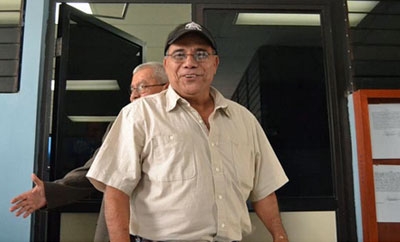El Salvador’s attorney general is taking the Al Capone route to nailing the Texis Cartel by charging the drug trafficking and money laundering group’s principal leaders with tax evasion, in the latest attempt to end the impunity they have enjoyed until now.
Authorities have formally charged two of the group’s three founders, Jose Adan Salazar, alias “Chepe Diablo,” and Mayor of Metapan Juan Umaña, as well as Umaña’s son Wilfredo Guerra, with evading taxes to the sum of $2.3 million, reported La Prensa Grafica.
SEE ALSO: Chepe Diablo Profile
Businessman Salazar is accused of personally avoiding $834,000 in tax, as well as almost $82,000 through his hotel chain Hotesa. Guerra faces charges of personally avoiding $637,000, as well as a further $365,000 through grain company Gumarsal, while Umaña is accused of not paying almost $69,000.
Though he cast doubt over the validity of the accusations, Salazar’s lawyer suggested his client could offer to pay off the outstanding tax bill, reported El Mundo.
The charges against Salazar and Umaña come 10 months after the arrest of cattle rancher Roberto “El Burro” Herrera, the third founder of the trafficking group, on charges of auto theft.
InSight Crime Analysis
For years, the Texis Cartel were untouchable, using top level contacts in politics, law enforcement and justice to avoid prosecution for their illegal activities.
The first cracks in this wall of impunity began to appear with the arrest of Herrera, who had previously wriggled out from under several attempts to bring him to justice. This was followed by the prosecution of several other Texis Cartel associates, as investigators inched closer to Umaña and arguably the biggest prize, Salazar — El Chepe Diablo.
At the time of Herrera’s arrest, officials told InSight Crime prosecution of the cartel would almost certainly focus on money not drugs, saying, “Even if they don’t find traces of cocaine, there are traces of cash” — and this has now proved the case.
Given the high-level connections that have facilitated the activities of the Texis Cartel for many years, this latest development in the case will be significant cause for concern for many Salvadoran powerbrokers. If Salazar, Umaña and Herrera reach a point where incarceration becomes unavoidable, they may decide to take corrupt public officials down with them.
However, such an outcome likely remains a long way off, with the financial resources available to the men likely to guarantee a drawn-out legal process. Extradition to the United States — where cooperation not connections serves as the only hope for a more lenient sentence — remains the greatest possibility for full disclosure from any of the arrested men but no request has yet been forthcoming in any of the cases.

